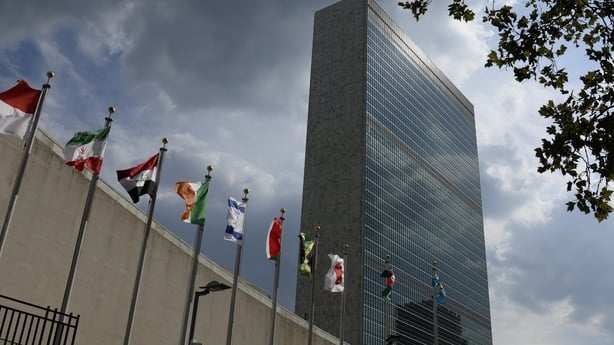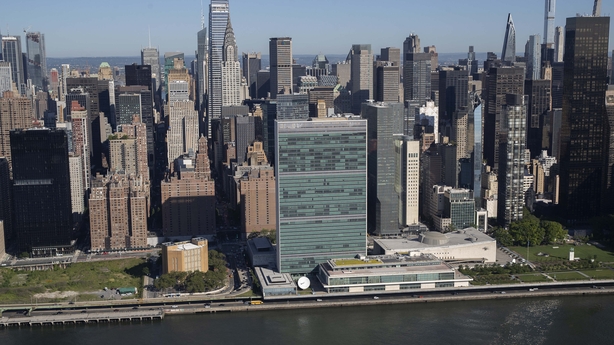On the 38th floor, atop the United Nations headquarters in New York, is the office of the Secretary-General, António Guterrez.
It was here, in the adjoining conference room with sweeping views across Manhattan, that he met Tánaiste Micheál Martin this week.
"We have no problems with Ireland," the Secretary-General joked, as they took their seats opposite each other and the press were quickly ushered out.
Later, the Tánaiste told RTÉ News what the two men had talked about.
The Secretary-General expressed his sympathies on the death of Irish peacekeeper Seán Rooney, who was killed in an attack on his convoy in South Lebanon in December 2022, the Tánaiste said.
The Secretary-General then turned to the latest challenges to the UN's Black Sea grain initiative – the deal between Turkey, Ukraine and Russia to ship grain and fertiliser out of the war-torn region to stem food shortages and rising prices across the developing world.
This week, Russia proposed an extension to the initiative of just 60 days, cutting in half the previous term of 120 days and leading to concerns inside the UN over potential disruption to global food supplies.
The conversation moved to the situation in Palestine - an issue Ireland was outspoken about during its recent term on the Security Council.
The Tánaiste said he raised his concerns about the escalating violence in the region and said that the Secretary General appreciated "the clear focus" Ireland had shown in its commitment to a two-state solution and "justice in terms of the treatment of Palestinians", the Tánaiste said.

The Government recently announced it would withdraw Ireland's 130 or so troops from the UN Peacekeeping Mission in the Golan Heights (UNDOF) in order to fulfil its commitment to the new European Union Battlegroup.
Did the Secretary General express any concern over the shift?
The Tánaiste said it was not raised but that Ireland’s long commitment to UN peacekeeping was deeply appreciated by the UN’s top leadership and that "we stand ready to participate in future peacekeeping missions," should they receive a mandate from the Security Council, he said.
"That in itself is becoming more challenging because of the situation on the Security Council, particularly the positions adopted by Russia," he added.
Asked by RTÉ News if the deadlock on the Security Council had undermined the relevance of the United Nations in the world today, the Tánaiste said that Russia’s invasion of Ukraine "does damage to the UN more broadly".
But, he added: "The UN is still a very relevant agency - it is fundamentally the glue the holds the world together, notwithstanding the imperfections."
Also on the agenda in the top floor room was sustainable development.
The UN has tasked Ireland, along with Qatar, to lead a review of the Sustainable Development Goals, due this September, to mark the halfway point towards implementation by 2030.
But any hope of implementing the goals on time is fading fast.
The economic devastation of the pandemic, plus food and energy insecurity caused by the war in Ukraine have knocked the goals "way off course", according to a European diplomat.

The sustainable development goals, or SDGs for short, are a list of 17 ambitious goals, and 169 targets – ranging from eradicating hunger and poverty to transitioning to clean energy to building sustainable cities and communities. They were adopted by the 193 member states in 2015.
But with world hunger on the rise, poverty worsening and fresh fossil fuel exploration under way, the US administration just gave the green light for a controversial oil-drilling project in Alaska, Ireland and Qatar will certainly have their work cut out knocking heads together over the coming months.
But getting sustainable development back on track is "a key piece of work for Ireland", the Tánaiste told RTÉ News.
"I do not think that Ireland has an impossible task – but it is a steep challenge, for sure," Frank Biermann, Professor of Global Sustainability Governance, Utrecht University told RTÉ News, describing the work of member states so far as "all talk and no action".
"Civil society and social movements need to prick the bubble of SDG talk," he said.
"Government leaders and industry bosses must not be allowed to hide behind SDG flags in their offices, SDG buttons on their lapels and SDG logos on their glossy pamphlets," he added.
With a series of events planned in New York to mark St Patrick’s Day, the Tánaiste said that the Irish Mission to the UN would "spread the love in terms of St Patrick".
But, given the scale of the challenges facing the UN this year, it might need the luck, not the love, of the Irish.







